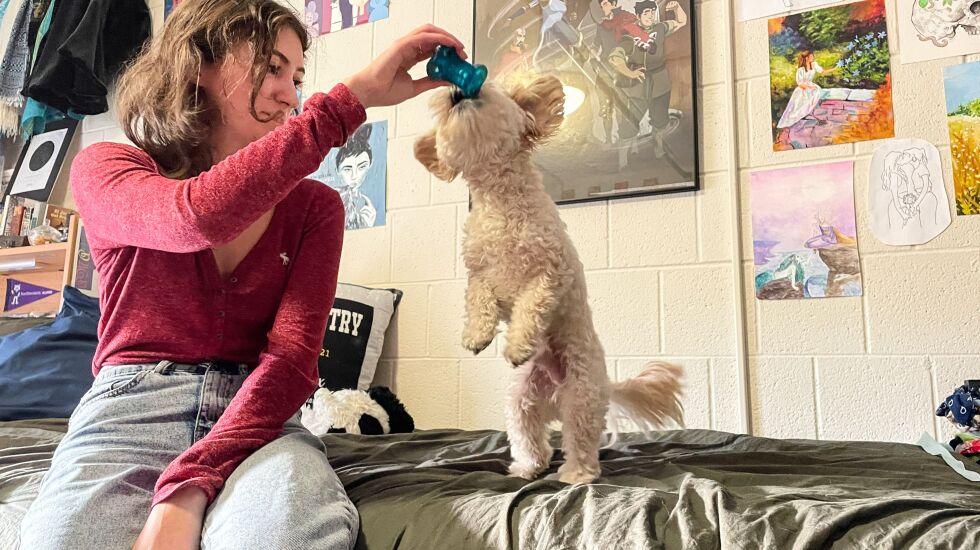
Amaya Mikolic-Berrios’ late-night library study marathons during her first two years at Northwestern University often were cut short.
Hero, a small white dog living in her dorm, needed to be fed.
The cavachon is the rising junior’s emotional support animal. Their journey to Northwestern is only one chapter in a decade-long story beginning when Mikolic-Berrios was in fifth grade and got Hero as a puppy.
“I wanted [Hero] to stay with me for college,” said Mikolic-Berrios, who has a depressive disorder and panic disorder. “I already knew throughout high school that he was very responsive to me emotionally and was really helpful when I was going through depressive episodes, so it was a no-brainer to try to bring him.”
As a flurry of students returns to college campuses across Chicago, many, like Mikolic-Berrios, will bring emotional support animals — some furry, some feathered, some even scaly and cold-blooded — to their dorms.
Gregory Moorehead, director of DePaul University’s Center for Students with Disabilities, said each year he sees more emotional support animals living on campus, a trend he links to more students coming to college with mental health concerns.
“When I came to DePaul in 2016, we had probably between 10 and 15 service and assistance animals,” Moorehead said. “Now, we have roughly between 50 and 60 of those animals registered with our office each school year.”
Emotional support animals — sometimes referred to as comfort or assistance animals — offer companionship and can help manage depression, anxiety and specific phobias, according to the Americans with Disabilities Act.
Unlike service animals, emotional support animals tend to have no special training to assist individuals with disabilities.
At the University of Illinois Chicago, the Disability Resource Center served about 2,800 students last school year, compared to about 1,500 students in the 2019-2020 school year. About 50 — just under 2% — were approved to have an assistance animal live in their dorms, said Sophia Hamilton, director of UIC’s Disability Resource Center.
In the past five years overall, UIC has “seen a large increase in requests for accommodations, period,” Hamilton said. Accommodation requests for assistance animals have grown at roughly the same rate, she added.
Students can register nearly any animal as a support animal as long as they can be legally owned as pets under state and city laws. Animals must be current on vaccinations, Moorehead said.
Local college officials said cats and dogs are the most common emotional support animals on campus, but they’ve also fielded requests for students looking to bring ferrets, turtles, bearded dragons and birds. The animals primarily stay within residence halls, as most schools don’t allow students to bring them to class.
Across most Chicago-area colleges, the process for students to request an emotional support animal is fairly similar: Students contact their school’s disability or accessibility office and complete a request form, then submit documentation from a licensed physician or mental health professional identifying why they require an emotional support animal. Students then meet with office staff to discuss campus guidelines for caring for their animals before getting approved.
“Over time, in colleges and in disability services, people began to realize the importance of having those animals when you make that transition from high school to college and you move away from home,” said Karen Pettus, Loyola University’s Student Accessibility Center director.
Just as the transition to college can be rough for students, it may also be difficult for pets, said Nancy Gee, a psychiatry professor and director of the Center for Human-Animal Interaction at Virginia Commonwealth University.
“The student may be gone for long hours, and then the animal is left alone and in a strange environment, and oftentimes universities aren’t set up for animals,” Gee said.
It’s important for college students to consider if they have the time to devote to caring for their emotional support animal, given their courseload and overall schedule, Gee said.

Mikolic-Berrios said it was sometimes difficult to balance being a student with caring for Hero, but the benefits outweighed any challenges.
Some skeptical students have told Mikolic-Berrios she got permission to keep Hero in her dorm just because she wanted to have her pet on campus. It’s a common misconception about emotional support animals in college settings, she said.
“Having that company, having another life to take care of can really help bring you out of difficult mental spaces,” Mikolic-Berrios said. “Even [Hero] forcing me to go out every day, to leave my room to take him on walks, feeding him, giving him water, reminded me subliminally that I need to feed myself and make sure I’m hydrated.”







